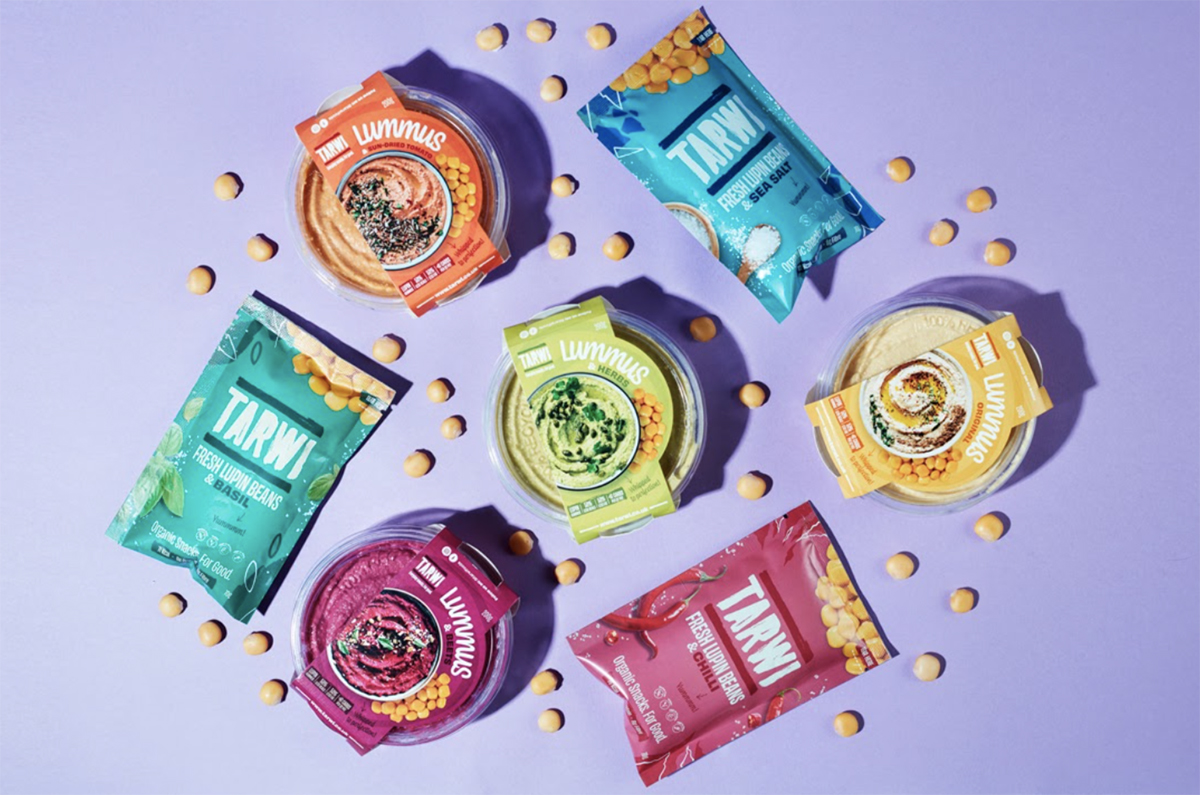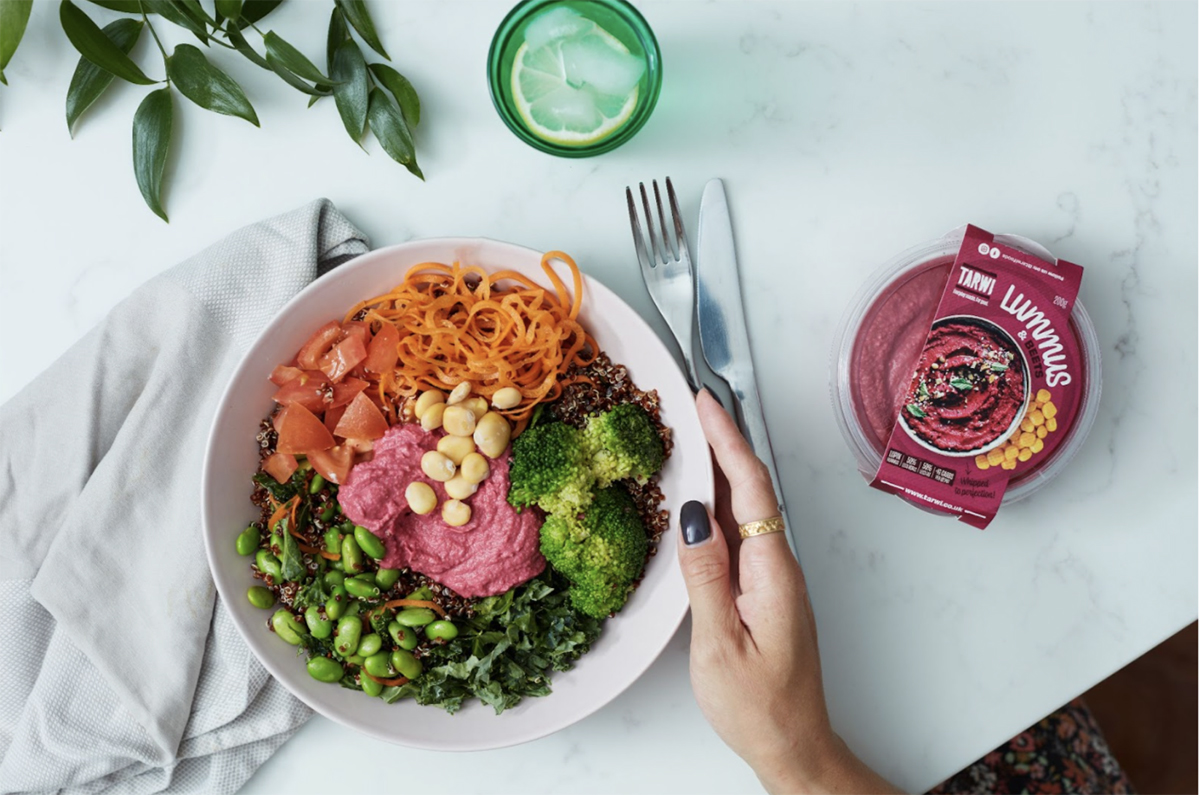February 2, 2022
This week, Madaline Dunn chatted to Tarwi's Cata Gorgulho to learn about the company's inception, its mission to popularize the lupin bean and how small dietary changes can have a big environmental impact.


Tarwi is a snack brand that's bringing the lupin bean to the UK market in an innovative and colorful way, with its lupin bean snack pouches and ‘lummus’, a hummus-like dip made from lupin beans. Founded by friends Cata Gorgulho, Alice Trewinnard and Pedro Godinho Ramos, the idea was to create a product that would positively impact people's health and the planet while simultaneously helping to kickstart the lupin bean revolution in the UK.
I'm originally from Portugal, but I moved to the UK in 2011 to study. I did my masters there and studied International Business – not related to food at all! Following that, I got a job in consulting and then moved into finance. However, in January 2020, I decided to look more into food and started Tarwi. I've always been interested in health and wellness and I knew that I wanted to be involved in an area that would enhance people's lives; it sounds a bit dreamy, but I wanted to have a positive impact on the world and I didn't feel passionate about the area I was working in.
I began looking more into lupin beans after my friend sent me a picture of a bag of lupin flakes. He pointed out how nutritious they are - full of protein and fiber - and that they are low-carb, too. Being from Portugal, I was already very familiar with lupin beans because they're something you’re given to snack on when drinking a beer and they're also sold in supermarkets in big buckets preserved in brine, but no one really knows that much about them. So, I started doing some research and I was fascinated by what I learnt. They have a protein content of 45% - double that of any other pulse - and contain three times more potassium than bananas, three times more iron than kale and three times more fiber than oats. I couldn't believe that the UK, a country so ahead in the plant-protein landscape, wasn't aware of this. In my research, I also discovered that the production of lupin beans has actually been on the decline - due, in part, to lack of awareness and demand. The majority of lupin bean production actually goes to animal feed as it's much cheaper than soy.
Interestingly, one of the authors of the research papers I read was Portuguese, so I decided to reach out to him as he's one of the biggest lupin bean researchers in Europe. I sat down with him and learned a bit about where lupins can and can't grow and also found out about some smaller European projects that are working to push lupin beans for human consumption and learned about all the possibilities.
Once I'd decided there was potential and I wanted to do something, I reached out to lupin bean farmers to understand more about who produces them and then tried things out in my own kitchen. Then it was all about finding someone who had a background in food and gaining insight into what we could do to bring lupin beans into the mainstream. That said, having a background in business, I understood how to position an idea and grow awareness and demand.

The first idea we had was to give people the actual bean but in a way that is easy to consume, so you can eat them on the go. If you go to Spain, Portugal or Italy, lupin beans are always sold in containers and preserved in brine. However, the issue is that they’re not usually branded and tend to be kind of hidden away on supermarket shelves. Secondly, the way they're sold in other countries means that they're not convenient. Say, for example, you want to eat lupin beans at work, the brine from the container can spill over and make a mess. So, our idea was to take the lupin beans as they are but change how they’re sold. Instead of putting them in a container, we put them in a pouch that can fit inside a backpack. Also, instead of preserving the lupins with lots of salt and additives as they are in Portugal, we decided to use lactic acid in the pouches.
One of our pouches contains the protein equivalent of one egg, so they're an all-natural protein source that you can have on the go and is much healthier than other snacks. Even other pulse-based snacks are sometimes fried or contain a lot of fat and salt so, at the end of the day, they're still not that good for you. We really wanted something straightforward – a product where you look at the ingredients list and know exactly what's in it. It tastes delicious, it's nutritious and the branding is appealing, too.
With our pouches, we use lots of colorful packaging that stands out on the shelf and, on the back, it tells you what lupin beans are and how you can eat them. So we pair branding and aesthetics with education! That was our first product and we have three variations: one cooked and seasoned with sea salt, one basil-flavored, and one chili-flavored.
At the end of last year, we also introduced our own version of hummus: 'lummus'. Hummus is highly consumed in the UK and Europe but our idea was to swap out chickpeas and leverage the power of lupin beans instead. Our dips have half the calories and half the fat of traditional hummus – they also have a very low carb count and are high in protein and fiber.
From the beginning, we wanted to ensure that production was local because we wanted to be as sustainable as possible, considering we’re a small company. One thing I love about lupin beans is that they grow naturally in Europe. So, all our operations are in Portugal at the moment. That said, there are sometimes limitations because lupin production is still being developed, so sometimes there isn't capacity in Portugal and we have to go somewhere else – we always try to be as close to home as possible, though.
Yes, sourcing has been challenging, especially because we're a small brand trying to do things differently. We'd also love to go organic but this kind of production is still very limited in Europe. Preservation has also been an issue we've had to navigate. Many big companies use lots of additives to preserve the quality and extend the shelf-life of their beans but we wanted to keep the product simple. So, finding people who are willing to do things differently, especially as a relatively small brand, has been a bit challenging but we've been lucky enough to find partners who want to come on this journey with us.

While it has been challenging, I've had no basis for comparison. So, in my mind, things have all moved at the right pace. We were lucky in that, in the beginning, we were able to push things forward. For example, in the first three months of 2020, we were able to secure a great supplier and two production partners before the world closed. In a way, it took the pressure off a little bit.
That said, the biggest challenge was that we took a big risk in launching a product with minimal consumer testing because the pandemic didn't allow it. I tried to do product testing with friends and family but deliveries were difficult between the UK and Portugal. So, because the five of us working on the product liked it, we just thought, "let's go for it and give it a try!"
Last year, we started selling online and we’ve had some really good feedback.
People love the lummus, especially because hummus is already established in the UK, and people understand it – there's only one novelty: the bean itself. It's so much lighter than traditional hummus, which people like, and we don't compromise on flavor at all. We've found a production partner who uses this new technology called HPP, which allows you to cold-press the packs. So, you take the pack and place it in a high-pressure, low temperature chamber and it extends the shelf life. Usually, hummus has a 30-day shelf life but ours has a 60-day shelf-life with all-natural ingredients and no additives. Also, the fact that it's never heated means the flavor is so much stronger and fresher.
On the other hand, we need to do a bit more educating with our pouches. When people have these kinds of snacks in the UK, they expect something dry and crunchy, but our lupins are soft like an edamame bean and people aren't expecting that. Currently, I think there's too much novelty – it's a novel format with a novel ingredient and we need more face-to-face time with consumers, which has been limited because of Covid-19. That being said, when people have a few, they really fall in love with them.
For us, sustainability is really important. Pedro, one of our co-founders, is an impact investor in his day-to-day job. He invests in businesses that have a good impact on the world, mainly from a sustainability point of view. Also, since I’m a bit of a dreamer, I thought if I'm going to quit my job then I want to do something I'm proud of. So, I look at my whole production chain, from sourcing to delivering to the customer, and try to see how I can leave things better than how I found them.
From a raw material point of view, we want to source all our lupin beans from Europe to ensure our carbon footprint is as low as possible. Likewise, with our production partners, we make sure to understand their environmental goals and ensure they have sustainable practices in place too.
Also, because pulses fix nitrogen in the soil as they grow, they're really good candidates for crop rotation, so we started partnering up with a supplier in Portugal who was growing a local network of farmers. This process involves talking to farmers about the benefits of the lupin bean, and encouraging them to grow lupin beans in between crops, then buying from them and sourcing our lupins from these farmers. The goal is to not only give back to the soil as you grow but also create an economy that creates more income for farmers.
A big challenge in the food industry is finding packaging that aligns with sustainability best practices. Our pouch is currently 100% recyclable. That said, one issue we encountered was how to find a type of packaging that both had a long shelf life and was recyclable. However, we’re currently testing a material that is 100% recyclable and would allow us to have at least a one-year shelf life.
The goal is always to keep moving because we need to grow to have the impact we want but, if something is not optimal, we strive to find better alternatives. However, sometimes we have to accept that there are things beyond our control.
We just want to keep growing. We've got another range of products that we are exploring and hoping to launch soon as well to try to bring lupins to the mainstream with products that people understand. For now, the focus is the UK market and building that.
If I have one goal for this year, it's that more and more Brits understand that lupin beans exist and they're incredible. I think lupins are going to explode because they have this potential that hasn't been fully realized or explored yet.
That will be a surprise! However, our focus is on everyday food – so think about the things you usually consume in your day-to-day but with lupin beans incorporated instead.
Disclaimer: The opinions or views expressed in this publication are those of the authors or quoted persons. They do not purport to reflect the opinions or views of the Global Pulse Confederation or its members.